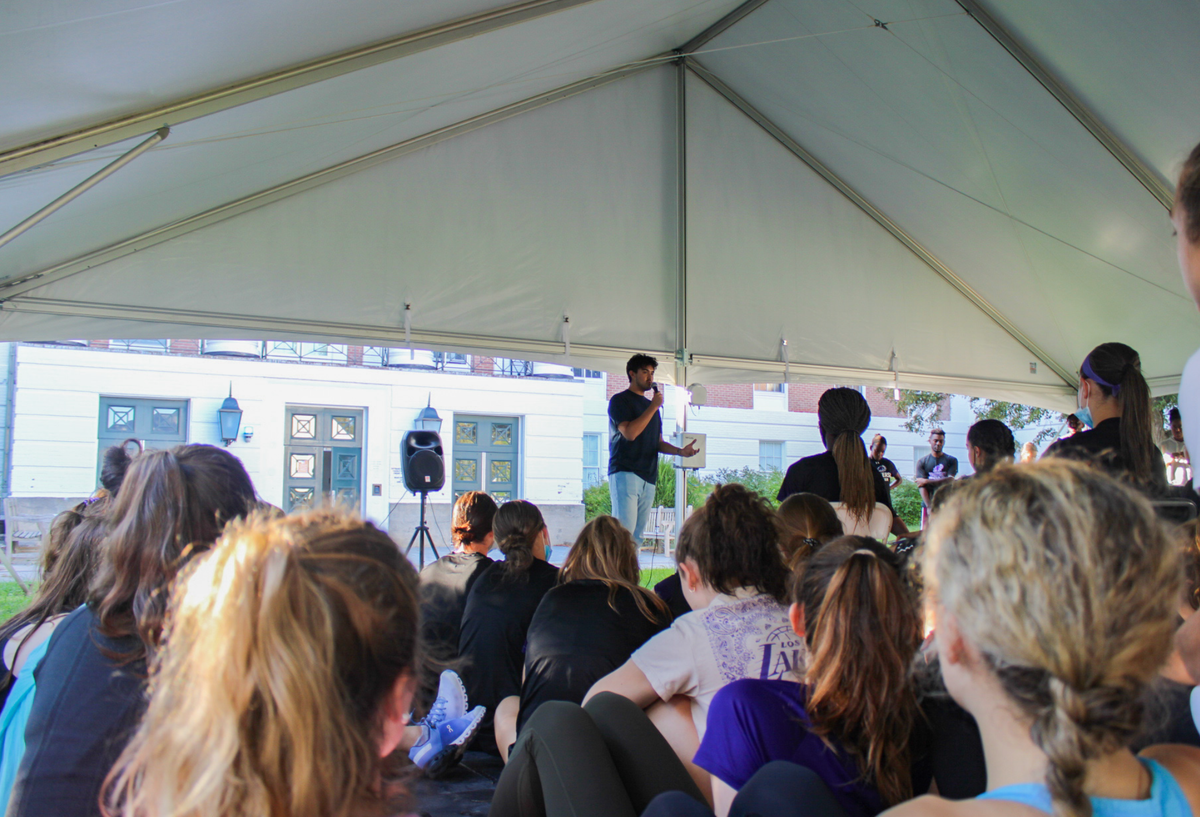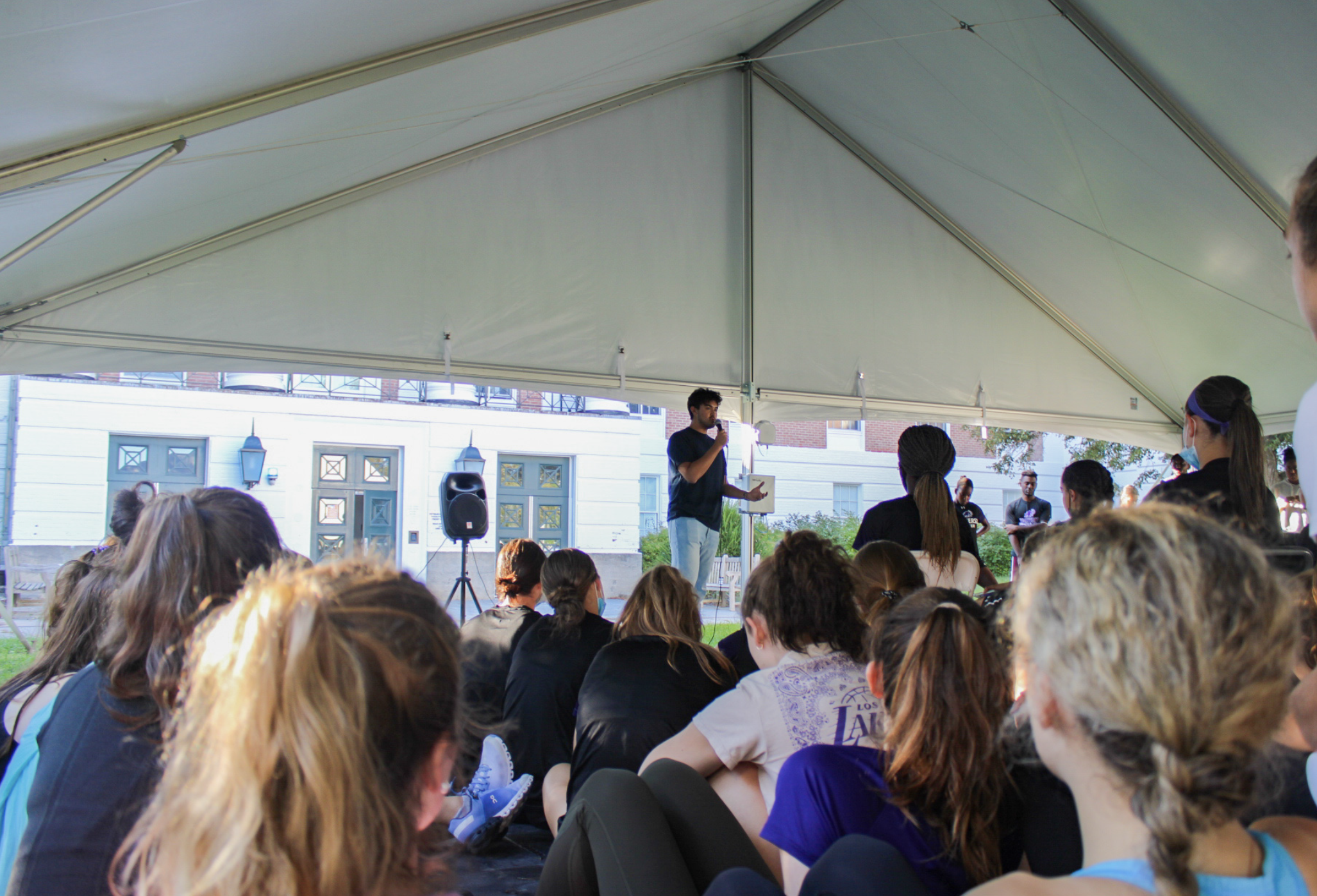CACSAC Walkout Prompts Changes to “Pay to Play” from Administration
On Oct. 6, the Council of Amherst College Student-Athletes of Color (CACSAC) held the CACSAC Walk Out of Practice Protest. The administration quickly responded to CACSAC's demands, most notably taking steps to ease "pay to play" barriers in the athletics department.

On Oct. 6, the Council of Amherst College Student-Athletes of Color (CACSAC) held the CACSAC Walk Out of Practice Protest, prompting the administration to quickly respond to the organization’s demands.
Open to all students, the walkout was sparked by the administration’s apparent lack of transparency when responding to the concerns of student-athletes of color. “Over the past ten years, and especially recently, the number of incidents in which the college has failed to protect its students is distressing and frustrating,” CACSAC President Aidan Park ’22 said.
The protest had three specific demands: eliminating “pay to play” barriers, ensuring a CACSAC E-Board is present at all head coaching hirings and scheduling a meeting between the E-Board and President Biddy Martin.
“Pay to play” consists of the costs that must come out of student-athletes’ pockets to play their sports, independent of tuition. These costs include, but are not limited to, equipment costs, travel costs and post-game meal costs.
While over half of Amherst’s first-year class self-identifies as students of color, that figure is significantly smaller on Amherst’s varsity sports teams. According to Park, the college has shown a commitment to increasing the socioeconomic diversity of its rosters, but in doing so, it has often failed to consider the consequences of that diversity, adding that “diversity without inclusivity is irresponsible.” Last summer, the administration began working on calculating the percentage of athletes of color that make up Amherst Athletics’ rosters, but have yet to release their findings.
Over two hundred people attended the walkout, a group which consisted mostly of student-athletes but also included a number of coaches and non-athletes as well.

The protest began as Park took the stage and thanked all in attendance, as well as the fellow E-Board members who organized the event. Park then emphasized that, for many, the isolating experience of being a student athlete of color can cause one to feel disconnected from the institution named on the front of their jersey. Instead of playing for the college, many athletes end up playing for their family, community, coaches and love of the game, he noted.
“The walkout,” Park said, “is a way of demonstrating not only what CACSAC demands, but forcing the college to acknowledge that we [student athletes of color] are a priority.”
Park called for action from the administration and handed the microphone over to fellow student-athletes to tell their stories.
A number of students spoke, including Jade DuVal ’22, Ruby Hastie ’22, Kelechi Eziri ’23, Juanita Jaramillo ’22, Mohammed Alausa ’24, Andrew Leung ’22 and Emma Cape ’22. Each athlete voiced different experiences, but almost all speeches echoed a similar sentiment — CACSAC members are tired of hollow commitments, promises and the “we must do betters” from administration.
Eziri’s comments went beyond addressing the administration’s inaction, taking an acute focus on the role that the student body must play in creating an inclusive community for student-athletes of color. “We see these bad things happen and we wonder how this could be condoned, but at the end of the day, we are the people allowing it to be perpetuated in our student culture, not the administration,” Eziri said.
“We want to see concrete, systemic change, and we believe this sentiment is reflected in our demands,” Park told The Student. He added that transparency from the administration in handling the concerns of student-athletes of color is of the utmost importance. “If you don’t know the details, especially given the history of the college, all you can do is wonder.”
To conclude the rally, Mika Fisher ’24 announced that the administration committed to fully funding athletics trips in the days leading up to the walkout. Additionally, the administration promised CACSAC E-Board members a spot in head coaching hirings, and Martin met with the E-Board on Wednesday, Oct. 13.
The meeting with Martin went well, according to Park. Martin was receptive to the message of CACSAC, and emphasized her commitment to do as much as she could for the community before stepping down at the end of the year.
However, Park wants it to be clear that these steps by the administration are by no means sufficient. “Fulfillment of what we are asking for is only one step on a continuous mission to make this campus the best it possibly can be. We want to continue working with other organizations in improving the experience of every student at Amherst College, and we want to see the administration take initiative on their own,” Park said.
Provost and Dean of the Faculty Catherine Epstein acknowledged the protests and stressed the administration’s commitment to working with CACSAC in the future. “We appreciate CACSAC bringing its concerns forward. As soon as they became known, we looked to address those we could immediately, such as paying for spring-break trips during which our teams compete, and raising the per diem amounts for team travel. We are working on the other issues, such as covering footwear and equipment costs, and hope to resolve them in the coming months," Epstein said.




Comments ()